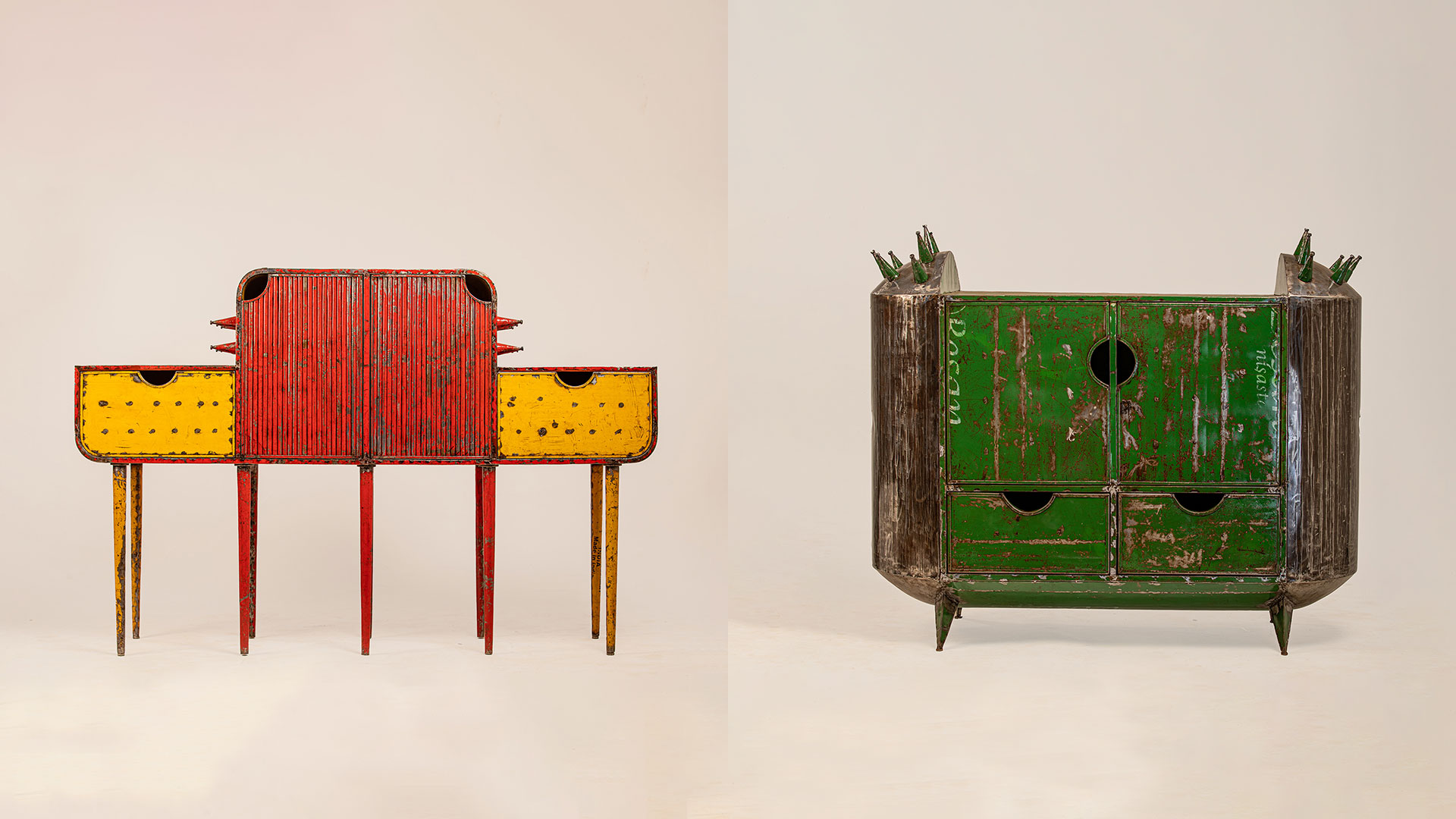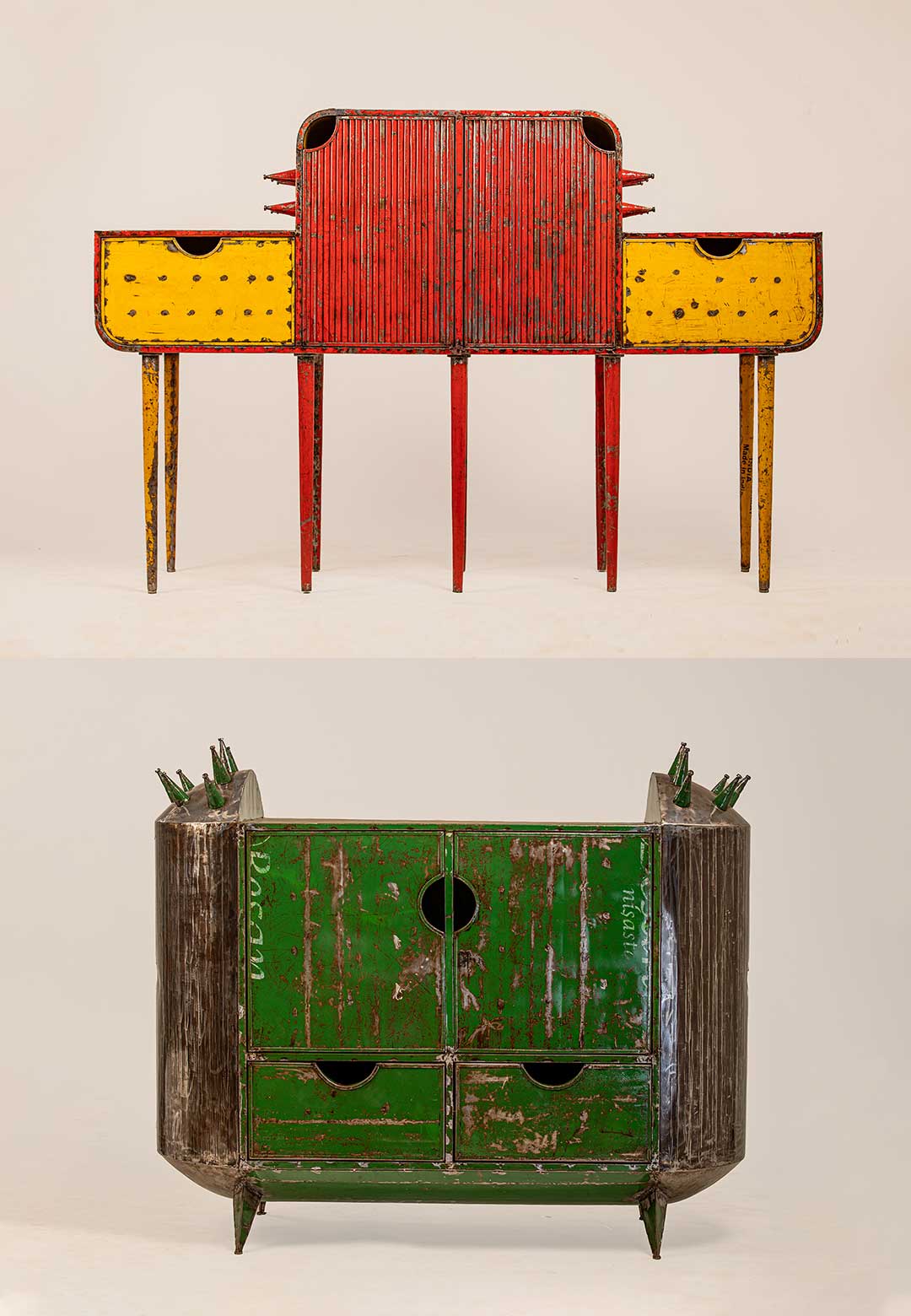The African country of Burkina Faso—a region driven by rapid urbanisation and increased economic activities—has witnessed an unprecedented increase in industrial waste materials. Colourful metal gasoline barrels are carelessly left along the streets, revealing heightened oil imports catering to the absence of fossil fuel production within the country. Hamed Ouattara, a multidisciplinary artist and designer from Ouagadougou in Burkina Faso, Africa, challenges this perception, despite it being commonly regarded as insignificant. The result is a series of bold, limited-edition collection of metal furniture named Bolibana.
Born in 1971, Ouattara studied accounting, after which he shifted to the disciplines of visual arts and design. He underwent training at the Olorun Foundation, the sole institution providing art education within Burkina Faso. Subsequently, he pursued a design program at France's Ecole Nationale Supérieure de Création Industrielle (ENSCI).
In 2002, he established Studio Hamed Ouattara (SHO), a hub for dedicated local artisans engaging in full-time work and gaining valuable technical apprenticeships. His studio deals in the transformation and upcycling of local, discarded objects into usable items. "In the Bamana language of West Africa, ‘Bolibana’ refers to the unusual end of a journey, a transformation," reads an excerpt from the press release shared by the gallery. His creative work involves scavenging materials such as metal, plastic, and wood, as well as repurposed petrol and oil drums, and shaping them into opulent and utilitarian furniture designs. Through mindful collaborations with artisans hailing from diverse regions within the country, Studio Hamed Ouattara customises its manufacturing and dissemination approaches to align with the prevailing sociopolitical context, encompassing factors such as equipment availability, energy supply, and material accessibility.
The furniture designer's latest collection Bolibana reflects this ideology and translates as 'the unusual end of a journey' or 'a transformation' in the Bamana language. The collection consists of cabinets and cupboards named 'Afrikya,' which translates to Africa; 'Djeli,' which encapsulates the spirit of a traditional West African storyteller who imparts oral traditions; and 'Budu,' signifying ethnicity. Each of these names represents potential embodiments of the African culture and heritage.
Rugged and soulful, the Bolibana collection captures the product designer's cumulative efforts, outlining two distinct, creative paths—one centred around repurposing industrial debris from Burkina Faso's advancing industrialisation and the other focused on refreshing the wisdom of craftsmanship that these shifts have diminished.
In the context of restricted resources and accessibility within Burkina Faso's vicinity, each crucial component, like hinges, nails, and tools (indispensable for crafting the furniture), is painstakingly produced right within the confines of the studio. The materials used in the making, such as metallic sheets and used oil drums, chronicle trade patterns and mirror regional progress and economic activity in the nation. The process of making involves a blend of ancestral cold-welding methods alongside contemporary techniques such as routing, riveting, and folding, which traverse through traditional metal patterns, forming the foundation for creating these product designs.
The design's concept also draws inspiration from Sudano-Sahelian architecture, often characterised by mudbricks, adobe plaster, and palm wood sticks, which protrude from the main earthen body of a building and cover much of its upper surface. For instance, the 'Budu,' 'Djeli,' and 'Afrikya' cabinets have large metal spikes jutting from their surfaces, as a tribute to the wood sticks, a key component of Sudano-Sahelian architecture. It traditionally serves as a scaffolding for reworking, which is done at regular intervals and involves the local community of West Africa.
The Bolibana collection by the African artist and designer directly responds to pressing issues, including excessive consumerism, resource utilisation, environmental impact, and the quest for sustainability. The collection is a tribute to age-old methods and artistic skills, with each item revealing a narrative that encapsulates memories of its creation while also reflecting the global challenges of environmental disparity and mass consumption.
Scheduled for its debut American showcase, the sustainable design collection is set to take centrestage as a solo exhibition hosted at Friedman Benda gallery in Los Angeles, USA. The design exhibition aims to introduce Bolibana to the American audience, serving as a platform for emerging contemporary designers hailing from the African diaspora, and hence, amplifying their voices and celebrating the richness of African culture. This event delves into the significance of design objects, extending their worth beyond mere functionality.
The exhibition is scheduled to unfold from September 5 - December 21, 2023, at the Friedman Benda Gallery in LA.
(Text by Irene Joseph, intern at STIR)






 Sign in with email
Sign in with email










What do you think?